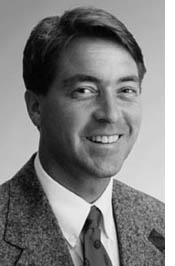Mark W. Rieger

2001 D.W. Brooks Award for Excellence in Teaching
Department: Horticulture
Horticulture Professor Mark Rieger's involvement in teaching is exemplary. He challenges his students while stimulating their interest. He has integrated distance education courses into the curriculum. He has earned an international reputation in horticulture and in his specialty: environmental stress physiology of fruit crops.
Dr. Rieger's student evaluations speak volumes about his dedication and expertise. He consistently receives high scores for his overall teaching abilities and his knowledge of the subject matter. One student noted that Dr. Rieger has high expectations but provides attentive guidance and support marked by an ability to listen.
Students have twice voted him "Professor of the Year" and are eager to point out Dr. Rieger's lasting impact upon their careers.
Since joining the department of horticulture faculty in 1987, he has developed six new courses; has taught 15 different courses, both undergraduate and graduate; and has taught six courses on a regular basis.
Perhaps one of Dr. Rieger's most notable accomplishments has been the adoption, development and integration of Web-based distance education courses into the curriculum of his department. Dr. Rieger is considered an early innovator who has adopted distance education technology to connect best with his students. His online course (HORT 3020) provides a textbook, course guide and supporting course materials. Students can access this course either by computer or by traditional correspondence.
In the words of one of Dr. Rieger's colleagues, "The University academic community is fortunate to have a professor whose capabilities, energies, and convictions lie with teaching and who has blended all teaching, research and service together for the benefit of his department, his college and, most of all, his students. He embodies to the highest degree the Brooks criteria: 'an unusually high commitment to pedagogy ... scholarship, ... concern for the development of the whole student, innovation in learning structures, disciplinary methodologies and adoption and integration of creative learning technologies.' "
